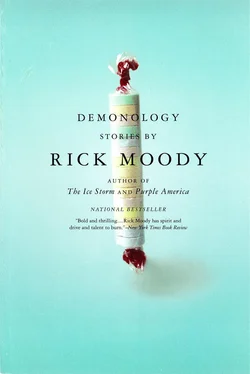The reception area in the Ticonderoga Room — where walls slid back from the altar to reveal the tables and the dance floor — was decorated in branches of forsythia and wisteria and other flowering vines and shrubs. It was spring. Linda was standing against a piece of white wicker latticework that I had borrowed from the florist in town (in return for promotional considerations), and sprigs of flowering trees garlanded it, garlanded the spot where Linda was standing. Pale colors haloed her.
— Right behind this screen, she said, when I swept up beside her and tapped her playfully on the shoulder, — check it out. There’s a couple falling in love once and for all. You can see it in their eyes.
I was sipping a Canadian spring water in a piece of company stemware. I reacted to Linda’s news nonchalantly. I didn’t think much of it. Yet I happened to notice that Linda’s expression was conspiratorial, impish, as well as a little beatific. Linda often covered her mouth with her hand when she’d said something riotous, as if to conceal unsightly dental work (on the contrary, her teeth were perfect), as if she’d been treated badly one too many times, as if the immensity of joy were embarrassing to her somehow. As she spoke of the couple in question her hand fluttered up to her mouth. Her slender fingertips probed delicately at her upper lip. My thoughts came in torrents: Where are Stig and Cheese and Blair? Why am I suddenly alone with this fellow employee? Is the couple Linda is speaking about part of the wedding party today? How many points will she get for the first sighting of their extramarital grappling?
Since it was my policy to investigate any and all such phenomena, I glanced desultorily around the screen and, seeing nothing out of the ordinary, slipped further into the shadows where the margins of Ticonderoga led toward the central catering staging area. There was, of course, no such couple behind the screen, or rather Linda (who was soon beside me) and myself were the couple and we were mottled by insufficient light, dappled by it, by lavender-tinted spots hung that morning by the lighting designers, and by reflections of a mirrored disco ball that speckled the dance floor.
— I don’t see anything, I said.
— Kiss me, Linda Pietrzsyk said. Her fingers closed lightly around the bulky part of my arm. There was an unfamiliar warmth in me. The band struck up some fast number. I think it was “It’s Raining Men”or maybe it was that song entitled “We Are Family,”which played so often at the Mansion on the Hill in the course of a weekend. Whichever, it was really loud. The horn players were getting into it. A trombonist yanked his slide back and forth.
— Excuse me? I said.
— Kiss me, Andrew, she said. — I want to kiss you.
Locating in myself a long-dormant impulsiveness, I reached down for Linda’s bangs, and with my clumsy hands I tried to push back her blond and strawberry-blond curlicues, and then, with a hitch in my motion, in a stop-time sequence of jerks, I embraced her. Her eyes, like neon, were illumined.
— Why don’t you tell me how you feel about me? Linda Pietrzsyk said. I was speechless, Sis. I didn’t know what to say. And she went on. There was something about me, something warm and friendly about me, I wasn’t fortified, she said; I wasn’t cold, I was just a good guy who actually cared about other people and you know how few of those there are. (I think these were her words.) She wanted to spend more time with me, she wanted to get to know me better, she wanted to give the roulette wheel a decisive spin: she repeated all this twice in slightly different ways with different modifiers. It made me sweat. The only way I could think to get her to quit talking was to kiss her in earnest, my lips brushing by hers the way the sun passes around and through the interstices of falling leaves on an October afternoon. I hadn’t kissed anyone in a long time. Her mouth tasted like cherry soda, like barbeque, like fresh hay and because of these startling tastes, I retreated. To arm’s length. Sis, I was scared. What was this rank taste of wet camp-fire and bone fragments that I’d had in my mouth since we scattered you over the Hudson? Did I come through this set of coincidences, these quotidian interventions by God, to work in a place where everything seemed to be about love, only to find that I couldn’t ever be a part of that grand word? How could I kiss anyone when I felt so awkward? What happened to me, what happened to all of us, to the texture of our lives, when you left us here?
I tried to ask Linda why she was doing what she was doing — behind the screen of wisteria and forsythia. I fumbled badly for these words. I believed she was trying to have a laugh on me. So she could go back and tell Cheese and Mick about it. So she could go gossip about me in the office, about what a jerk that Wakefield was. Man, Andrew Wakefield thinks there’s something worth hoping for in this world. I thought she was joking, and I was through being the joke, being the Chicken Mask, being the harlequin.
— I’m not doing anything to you, Andrew, Linda said. — I’m expressing myself. It’s supposed to be a good thing.
Reaching, she laid a palm flush against my face.
— I know you aren’t…
— So what’s the problem?
I was ambitious to reassure. If I could have stayed the hand that fluttered up to cover her mouth, so that she could laugh unreservedly, so that her laughter peeled out in the Ticonderoga Room… But I just wasn’t up to it yet. I got out of there. I danced across the floor at the Wackerman wedding — I was a party of one — and the Wackermans and the Delgados and their kin probably thought I was singing along with “Desperado”by the Eagles (it was the anthem of the new Mr. and Mrs. Fritz Wackerman), but really I was talking to myself, about work, about how Mike Tombello’s best man wanted to give his toast while doing flips on a trampoline, about how Jenny Parmenter wanted live goats bleating in the Mansion parking lot, as a fertility symbol, as she sped away, in her Rolls Cornische, to the Thousand Islands. Boy, I always hated the Eagles.
Okay, to get back to Glenda Manzini. Linda Pietrzsyk didn’t write me off after our failed embraces, but she sure gave me more room. She was out the door at 5:01 for several weeks, without asking after me, without a kind word for anyone, and I didn’t blame her. But in the end who else was there to talk to? To Marie O’Neill, the accountant? To Paul Avakian, the human resources and insurance guy and petty-cash manager? To Rachel Levy, the head chef? Maybe it was more than this. Maybe the bond that forms between people doesn’t get unmade so easily. Maybe it leaves its mark for a long time. Soon Linda and I ate our bagged lunches together again, trading varieties of puddings, often in total silence; at least this was the habit until we found a new area of common interest in our reservations about Glenda Manzini’s management techniques. This happened to be when Glenda took a week off. What a miracle. I’d been employed at the Mansion six months. The staff was in a fine mood about Glenda’s hiatus. There was a carnival atmosphere. Dorcas Gilbey had been stockpiling leftover ales for an office shindig featuring dancing and the recitation of really bad marital vows we’d heard. Linda and I went along with the festivities, but we were also formulating a strategy.
What we wanted to know was how Glenda became so unreservedly cruel. We wanted the inside story on her personal life. We wanted the skinny. How do you produce an individual like Glenda? What is the mass-production technique? We waited until Wednesday after the afternoon beer-tasting party. We were staying late, we claimed, in order to separate out the green M&Ms for the marriage of U.V.M. tight end Brad Doelp who had requested bowls of M&Ms at his reception, excluding any and all green candies. When our fellow employees were gone, right at five, we broke into Glenda’s office.
Читать дальше












